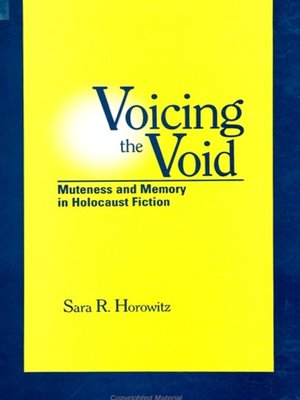Voicing the Void
ebook ∣ Muteness and Memory in Holocaust Fiction · SUNY Series in Modern Jewish Literature and Culture
By Sara R. Horowitz

Sign up to save your library
With an OverDrive account, you can save your favorite libraries for at-a-glance information about availability. Find out more about OverDrive accounts.
Find this title in Libby, the library reading app by OverDrive.



Search for a digital library with this title
Title found at these libraries:
| Library Name | Distance |
|---|---|
| Loading... |
Explores the connections between muteness and the complicated acts of survival, testimony, memory, and interpretation, through focused readings of Holocaust fiction by Kosinski, Wiesel, Tournier, Ida Fink, and others.
CHOICE 1997 Outstanding Academic Books
Through new close readings of Holocaust fiction, this book takes the field of Holocaust Studies in an important new direction. Reading a wide range of narratives representing different nationalities, styles, genders, and approaches, Horowitz demonstrates that muteness not only expresses the difficulty in saying anything meaningful about the Holocaust-it also represents something essential about the nature of the event itself. The radical negativity of the Holocaust ruptures the fabric of history and memory, emptying both narrative and life of meaning. At the heart of Holocaust fiction lies a tension between the silence that speaks the rupture, and the narrative forms that attempt to represent, to bridge it.
This book argues that the central issues in Holocaust historiography and literary criticism are not simply prompted by the fictionality of imaginative literature-they are already embedded as self-critique in the fictional narratives. While the current critical discourse argues either for or against the unrepresentability of these events (and thus the appropriateness of imaginative literature), this book develops the theme of muteness as the central way in which literary texts explore and provisionally resolve these central issues. Focusing on the problem of muteness helps unfold the ambivalences and ambiguities that shape the way we read Holocaust fiction, and the way we think about the Holocaust itself.







